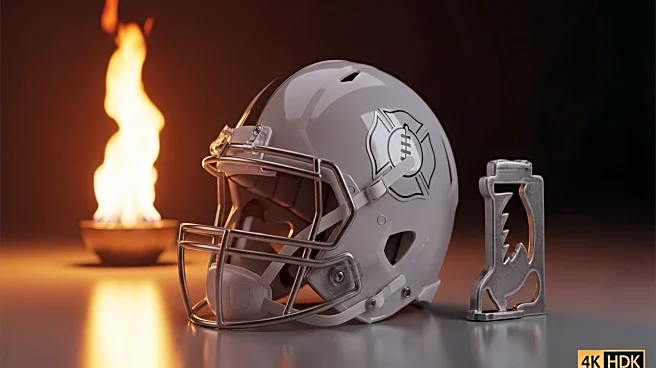What's Happening?
Larry Pickett Jr., a safety for the Army football team and second-year cadet at the U.S. Military Academy, performed a heroic rescue on Route 9W in Fort Montgomery, New York. Pickett, along with his father, saved a man from a burning vehicle after it crashed into a utility pole, causing downed power lines. The incident occurred near West Point, and the vehicle burst into flames shortly after the rescue. Pickett's quick response was attributed to his military training, as he immediately ran towards the vehicle upon witnessing the accident. His actions were captured in videos posted by his family on Facebook, showing the rescue effort. Army athletic director Tom Theodorakis and the U.S. Military Academy commended Pickett and his father for their bravery and quick thinking.
Why It's Important?
The actions of Larry Pickett Jr. highlight the values and training instilled in cadets at the U.S. Military Academy, emphasizing courage and readiness to act in emergencies. This incident not only showcases individual heroism but also reflects positively on the institution's emphasis on leadership and service. Such acts can inspire others in the community and reinforce the importance of military training in real-world situations. The recognition from the Army athletic director and the academy underscores the significance of character and valor, which are central to military education and service.
What's Next?
Following the rescue, Larry Pickett Jr. may receive further recognition from both military and civilian organizations for his bravery. The incident could lead to increased awareness and discussions about emergency preparedness and the role of military training in civilian life. The U.S. Military Academy might use this event to highlight the importance of their training programs and potentially incorporate similar real-life scenarios into their curriculum to prepare cadets for unexpected situations.
Beyond the Headlines
This event raises questions about the role of military personnel in civilian emergencies and the potential for cadets to serve as role models in their communities. It also touches on the ethical responsibility of individuals to assist in crises, regardless of their professional background. The cultural impact of such heroism can foster a sense of community and shared responsibility, encouraging others to act selflessly in times of need.









